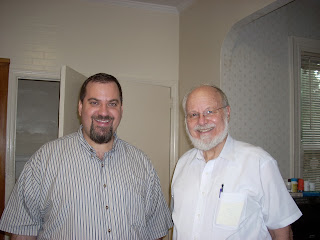Can prayers time travel?
Cross-posted on DovBear
This is a rather esoteric question that doesn’t have a “real” answer, (and the basis of the question itself is a bit unrealistic) but is still something interesting to think about.
The other day, I was cleaning off my desk at home in advance of Pesach. (Yes, I’ve eaten at my desk.) While going through papers, I came across a scribbled note in my handwriting that read “Zalman ben Sara Chana” obviously written to remind myself to say tehillim for the person for a refuah shelema.
I have no idea when I wrote the note, but judging by the pile of mail it was in, it was sometime in past few months. I also have no idea who the person is. Someone must have asked me to say tehillim for this Zalman, or perhaps I saw it in an email. Either way, I obviously intended to say tehillim for him. But did I ever do so? It was lost on my desk, so there’s a fair chance I never did get to daven for his recovery.
For all I know, he may have passed away in the meantime, or, hopefully, had a full recovery. So the tefillot may no longer be needed. But just in case, I decided to say a perek of tehillim anyhow in his name.
Here’s the esoteric part. Since I don’t know what happened to Zalman, and Hashem isn’t bound by time, can my tefillot somehow zoom back in time to when it was needed and help Zalman then? Would my prayers be added to all the others who davened for him several months ago and have an effect in the past? In effect, can tefilla time travel?
Think of it like quantum mechanics. In quantum mechanics, a particle’s state isn’t fixed until we observe it. In Erwin Schrödinger’s famous experiment, a cat in a box is neither alive nor dead (based on the poison released in the box depending on a quantum particle’s possible state). According to the weird rules of quantum physics, the cat is only fixed into its state of being alive or dead when we open the box and see it. So in a sense, the past only becomes fixed when we know what happened. Until then, either possibility is real.
So in Zalman’s case, the fact that I don’t know what happened to him can, in effect, make the possibility of his full recovery several months ago a real possibility. His past, at least from my own perspective, is not fixed. And as long as his state of health isn’t fixed, my prayers can still have an effect.
As I wrote above, there’s no real answer, but it’s an interesting way to think about it, and it feels good to daven for someone feeling that my prayers can still make a difference even after the fact.
So what do you think – can tefilla time travel?
This is a rather esoteric question that doesn’t have a “real” answer, (and the basis of the question itself is a bit unrealistic) but is still something interesting to think about.
The other day, I was cleaning off my desk at home in advance of Pesach. (Yes, I’ve eaten at my desk.) While going through papers, I came across a scribbled note in my handwriting that read “Zalman ben Sara Chana” obviously written to remind myself to say tehillim for the person for a refuah shelema.
I have no idea when I wrote the note, but judging by the pile of mail it was in, it was sometime in past few months. I also have no idea who the person is. Someone must have asked me to say tehillim for this Zalman, or perhaps I saw it in an email. Either way, I obviously intended to say tehillim for him. But did I ever do so? It was lost on my desk, so there’s a fair chance I never did get to daven for his recovery.
For all I know, he may have passed away in the meantime, or, hopefully, had a full recovery. So the tefillot may no longer be needed. But just in case, I decided to say a perek of tehillim anyhow in his name.
Here’s the esoteric part. Since I don’t know what happened to Zalman, and Hashem isn’t bound by time, can my tefillot somehow zoom back in time to when it was needed and help Zalman then? Would my prayers be added to all the others who davened for him several months ago and have an effect in the past? In effect, can tefilla time travel?
Think of it like quantum mechanics. In quantum mechanics, a particle’s state isn’t fixed until we observe it. In Erwin Schrödinger’s famous experiment, a cat in a box is neither alive nor dead (based on the poison released in the box depending on a quantum particle’s possible state). According to the weird rules of quantum physics, the cat is only fixed into its state of being alive or dead when we open the box and see it. So in a sense, the past only becomes fixed when we know what happened. Until then, either possibility is real.
So in Zalman’s case, the fact that I don’t know what happened to him can, in effect, make the possibility of his full recovery several months ago a real possibility. His past, at least from my own perspective, is not fixed. And as long as his state of health isn’t fixed, my prayers can still have an effect.
As I wrote above, there’s no real answer, but it’s an interesting way to think about it, and it feels good to daven for someone feeling that my prayers can still make a difference even after the fact.
So what do you think – can tefilla time travel?

Comments
Post a Comment